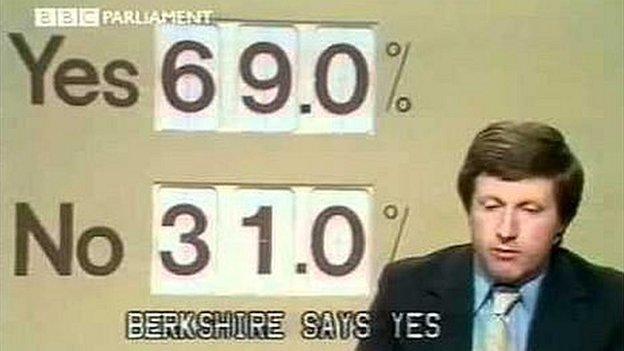Cameron sidesteps call to avoid polls clash for voters
- Published
- comments

The BBC's 1975 referendum result coverage was anchored by David Dimblebly.
David Cameron has refused to rule out having the EU referendum on the same day as devolved elections next year. Despite protests from the Welsh government and the presiding officer of the National Assembly, Mr Cameron is keeping the option open of having a vote next May.
He told MPs: "My view is the timing of the referendum should be determined by the timing of the renegotiation. When the renegotiation is complete, we set a date for the referendum.
"I don't myself think it should be determined by the timing of other elections." He said he had been content the referendum on whether Britain should change its voting system was held on the same day as other elections (including National Assembly ones).
"I think people are capable of making those two decisions," he added.
Labour has said it will try to amend the EU Referendum Bill to avoid a clash with the assembly elections. Shadow Welsh Secretary Owen Smith pointed out that Secretary of State for Wales Stephen Crabb told The Wales Report with Huw Edwards on May 20: "A vote on the same day as the Scottish and Welsh elections in 2016 isn't ideal; I think it would blur those elections unhealthily and we do need the time for the negotiation to happen and for the political debate to happen too."
Mr Smith said: "Stephen Crabb has acknowledged that it wouldn't be healthy for the votes to be held on the same day so I challenge him and his Welsh Conservative colleagues to join with Labour and ensure that our vitally important Welsh elections are given the prominence they deserve."
'Double majority'
There appears to be clear red water between Mr Smith and First Minister Carwyn Jones over whether Wales should have a veto over the UK's potential exit from the EU.
Mr Jones said last week it would be unacceptable for Britain to leave the EU unless each nation agreed. But Mr Smith said: "I am also clear that the decision in the referendum is one that should be made by the UK as a whole, not by the individual countries of the UK. That is the legal position, as it is the UK, not Wales or Scotland, which is the member state.
"I want the voice of Wales to be heard loudly in the debate about Britain's future membership of the EU, but as a supporter of the solidarity of the Union of the UK, I do not believe that any one nation or region can reasonably expect to hold a veto over the others."
Plaid Cymru seized on the difference, with a spokesperson saying: "Plaid Cymru's proposals for a double majority would ensure that Wales isn't dragged out of the EU against its will. If the UK is truly a family of nations, provision must be made for an exit from the EU to require the consent of each constituent nation.
"While the Labour First Minister has acknowledged that Plaid Cymru is 'morally right' on this issue, it is clear from what the shadow secretary of state has said that Labour will continue to put its votes in England first and continue to refuse to stand up for Wales."
Europe is an issue that does tend to divide parties. Plaid Cymru and the SNP may have formed a joint parliamentary group in the last parliament, and pledged to work together "whenever possible" in this one, but Plaid's MPs declined to support their Scottish allies in Tuesday night's vote by (anti-referendum) SNP MPs against the EU Referendum Bill.
If you can't wait even a few months for the referendum, you can watch two hours of coverage from the 1975 results programme here. Enjoy!